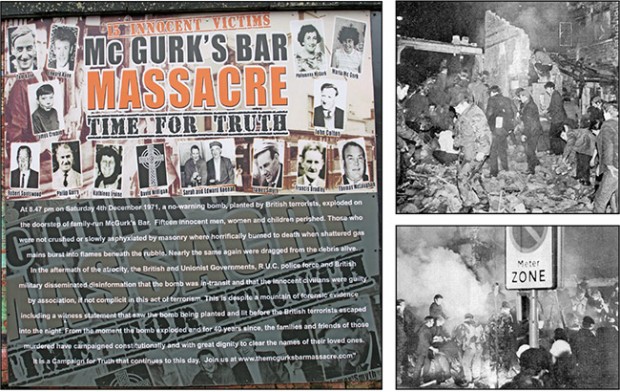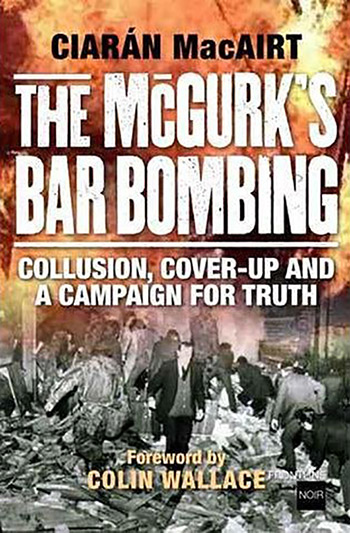1 August 2016 Edition
Information and disclosure vital to the McGurk’s families – Ciarán Mac Airt
UNCOMFORTABLE CONVERSATIONS

• 15 people died when the UVF bombed McGurk's Bar in Belfast in 1971
The evidence is that the British state is not up for the ‘Uncomfortable Conversations’ on legacy as its leaders’ focus is to protect their own interest over the needs of families
Ciarán Mac Airt is author of The McGurk’s Bar Bombing: Collusion, Cover-Up and a Campaign for Truth
THE STRATEGY of the British state is to prevent any ‘Uncomfortable Conversation’ about its role in perpetuating, sustaining and prolonging the conflict in Ireland.
At its core, the strategy is deny information and disclosure to families murdered by the British state and its surrogates within militant loyalism. This has been challenged and resisted by families. The evidence is that the British state is not up for the ‘Uncomfortable Conversations’ on legacy as its leaders’ focus is to protect their own interest over the needs of families.
On 4 December 1971, the Ulster Volunteer Force (UVF) planted a no-warning bomb on the doorstep of McGurk’s Bar. The bar was located at the corner of North Queen Street and Great Georges Street, close to St Patrick’s Church in north Belfast. As the bomb exploded, 15 innocent men, women and children lay dead; 16 others were seriously injured as the building collapsed.
Within 12 hours, the Royal Ulster Constabulary (RUC) circulated the lie that the McGurk’s Bar bombing was an IRA “own goal” (i.e. premature explosion). This RUC lie sought to criminalise the innocent victims of the massacre rather than investigate the UVF gang who planted the bomb. This lie was then spread by the British Government, the unionist politicians and the complicit media.
The focus of the lie was that the IRA had either been making the bomb in the bar or transporting it from the bar. This lie was part of a wider British policy of disinformation which was designed to distract attention from Britain’s conflict policies and actions. Lies and falsehoods were a key thrust of their black propaganda strategy.
The families and the local community always knew this to be a lie. The McGurk’s families now have the British Army, police and Government documents to prove it, obtained from Britain’s own archives.
These secret papers show that two days after the atrocity, Prime Minister Brian Faulkner, in a meeting with British Home Secretary Reginald Maudling, advanced the theory of an IRA “own goal” and brazenly admitted to political interference in the RUC investigation. The British documents prove that the cover-up went right to the top of the political establishment.

On 16 December, RUC Chief Constable George Shillington told Prime Minister Brian Faulkner, Minister of State for Home Affairs John Taylor, and the General Officer Commanding the British forces, Lieutenant-General Sir Harry Tuzo:
“Circumstantial evidence indicates that this was a premature detonation and two of those killed were known IRA members, at least one of whom had been associated with bombing activities. Intelligence indicates that the bomb was destined for use elsewhere in the city.”
This is damning proof that the RUC told lies and misled government. ‘Investigative bias’ on the part of the RUC was also later recognised in a Police Ombudsman Report. Families now want to know why the lies were told. Such lies on top of political cover-up have unquestionably compounded family loss and grief.
The families are campaigning for the documents about the McGurk’s Bar bombing and subsequent cover-up to be made public. The British response has been to hide and conceal documents.
They hide behind the shield of so-called “national security”. How do so-called British “national security” interests trump the rights of families seeking the truth? And what national security interests could possibly be at stake 45 years after the deaths?
For the McGurk’s families, “national security” is a blanket shield being used a weapon to deny the truth.
The documents that detail British policy decisions and their propaganda considerations are held in Whitehall, the Public Records Office and National Archives. Withholding information is core to their conflict policy. It is vital that these archives, information vaults and files are opened.
Accessing information is vital for these families. Ending the so-called “national security” veto and maximising information disclosure are vital to unlocking the truth about the McGurk’s Bar massacre. This is the real ‘Uncomfortable Conversation’ that the British state is unwilling and reluctant to have with families.
Ciarán Mac Airt’s grandmother, Kathleen Irvine, was one of the 15 civilians murdered in the McGurk’s Bar attack on 4 December 1971. Mac Airt is also manager of the charity Paper Trail, which helps other families who lost loved ones during the conflict access information in public records. More information available on the family campaign at www.mcgurksbar.com
Editor’s Note: Guest writers in the Uncomfortable Conversations series use their own terminology and do not always reflect the house style of An Phoblacht.




